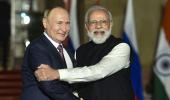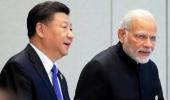Prime Minister Narendra Modi on Friday called on the Shanghai Cooperation Organisation to develop reliable and resilient supply chains to offset the disruptions caused by the Covid-19 pandemic and the Ukraine crisis and said better connectivity and granting "full rights" of transit facilities by member states is important to achieve the goal.

In his address at the summit of the eight-member grouping in this historic Uzbek city, Modi said the Indian economy is expected to grow at 7.5 per cent this year and that India supports "greater cooperation and mutual trust" among the Shanghai Cooperation Organisation member states.
With Russian President Vladimir Putin, Chinese President Xi Jinping, Pakistan Prime Minister Shehbaz Sharif and other leaders of the bloc listening, Modi said the pandemic and the Ukraine crisis have caused many disruptions in global supply chains, leaving the world facing "unprecedented" energy and food crises.
It is for the first time Modi and Xi came face-to-face at the summit in Samarkand since the start of the border standoff between India and China in eastern Ladakh around 28 months back.
"India supports greater cooperation and mutual trust among SCO members. The pandemic and the crisis in Ukraine have caused many disruptions in global supply chains, leaving the world facing unprecedented energy and food crises," he said.
"The SCO should strive to develop reliable, resilient and diversified supply chains in our region. For this, better connectivity will be required, as well as it will also be important that we all give full rights of transit to each other," he said.
Modi's emphasises on transit for trade comes amid Pakistan's reluctance to provide such a facility for two-way trade between India and Pakistan.
Referring to food insecurity across the globe, the prime minister pitched for promotion of the cultivation and consumption of millets.
"The world today faces another major challenge and that is ensuring the food security of our citizens. One possible solution to this problem is to promote the cultivation and consumption of millets," he said.
"Millets is a superfood that has been grown for thousands of years, not only in SCO countries, but in many parts of the world, and is a traditional, nutritious and low-cost alternative to the food crisis," Modi said.
The prime minister said the SCO should consider organising a 'Millet Food Festival'.
Talking about economic cooperation, the prime minister said the role of the SCO has become very important when the whole world is facing the challenges of economic recovery after the pandemic.
He also noted that the SCO member countries contribute about 30 per cent to global GDP, and 40 per cent of the world's population also resides in member countries of the grouping.
"We are making progress on making India a manufacturing hub. India's young and talented workforce makes us naturally competitive. India's economy is expected to grow at 7.5 per cent this year, which will be the highest among the world's major economies," Modi said.
The prime minister also talked about India's focus on proper use of technology in its people-centric development model.
"We are supporting innovation in every sector. Today there are over 70,000 start-ups in India, of which over 100 are unicorns. This experience of ours can be of use to many other SCO members as well," the prime minister said.
"For this purpose, we are ready to share our experience with the member countries of SCO by establishing a new Special Working Group on Startups and Innovation," he added.
The prime minister said India today is one of the most affordable destinations for medical and wellness tourism in the world.
"The WHO Global Center for Traditional Medicine was inaugurated in Gujarat in April 2022. This will be the WHO's first and only Global Center for Traditional Medicine," Modi said.
"We should increase cooperation on traditional medicine among SCO countries. For this, India will take initiative on a new SCO Working Group on Traditional Medicine," he said.
The SCO was founded at a summit in Shanghai in 2001 by the presidents of Russia, China, the Kyrgyz Republic, Kazakhstan, Tajikistan and Uzbekistan.
Over the years, it has emerged as one of the largest trans-regional international organisations. India and Pakistan became its permanent members in 2017.
Iran is likely to be given the status of a permanent member of the SCO at the Samarkand summit.











 © 2025
© 2025